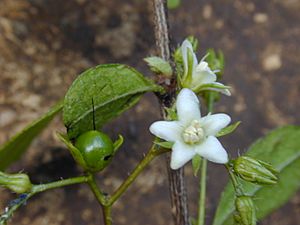Fukien tea tree facts for kids
Quick facts for kids Fukien tea tree |
|
|---|---|
 |
|
| Flower, fruit and leaf | |
| Scientific classification |
|
| Kingdom: | Plantae |
| Clade: | Tracheophytes |
| Clade: | Angiosperms |
| Clade: | Eudicots |
| Clade: | Asterids |
| Order: | Boraginales |
| Family: | Boraginaceae |
| Genus: | Ehretia |
| Species: |
E. microphylla
|
| Binomial name | |
| Ehretia microphylla Lam.
|
|
| Script error: The function "autoWithCaption" does not exist. | |
| Synonyms | |
|
|
Script error: No such module "Check for conflicting parameters".
The Fukien tea tree (also called Ehretia microphylla or Carmona retusa) is a type of flowering plant. It belongs to the borage family, known as Boraginaceae. People also call it the Philippine tea tree.
Contents
What Does the Fukien Tea Tree Look Like?
The Fukien tea tree is a shrub that can grow up to 4 meters (about 13 feet) tall. It has long, thin branches that spread out. During the dry season, it loses its leaves. This is called being deciduous.
Leaves, Flowers, and Fruits
The leaves of this tree are usually 10 to 50 millimeters long and 5 to 30 millimeters wide. They can look different in size, feel, color, and how their edges are shaped.
The tree produces small white flowers. These flowers are about 8 to 10 millimeters wide. They have a part called a corolla with 4 or 5 lobes. After the flowers, the tree grows small, round fruits called drupes. These fruits are about 4 to 6 millimeters wide and turn brownish-orange when they are ripe.
Where Does the Fukien Tea Tree Grow?
The Fukien tea tree grows naturally in many parts of eastern and southeastern Asia. You can find it in India, Indochina, southern China, Taiwan, and Japan. It also grows in Malesia, which includes Christmas Island (an Australian territory). From there, it reaches New Guinea, mainland Australia (in the Cape York Peninsula), and the Solomon Islands.
Fukien Tea Tree as an Invasive Species
In Hawaii, the Fukien tea tree has become an invasive species. This means it grows very easily and can sometimes take over areas where other plants usually grow. It is a popular ornamental plant in Hawaii, meaning people like to grow it for its beauty. Birds that eat fruit help spread its seeds around.
Natural Habitats
On the Cape York Peninsula in Australia, this plant is found in thickets of semi-evergreen vines. On Christmas Island, it prefers dry areas on the marine terraces. Sometimes, it can also be found in rainforests.
How Do People Use the Fukien Tea Tree?
The Fukien tea tree is very popular in Penjing in China. Penjing is an ancient Chinese art form similar to bonsai. It involves creating miniature landscapes with trees and rocks in a tray.
Medicinal Uses
In the Philippines, people use the leaves of the Fukien tea tree as a traditional medicine. They use it to help treat problems like coughs, stomach pain (called colic), and issues like diarrhea and dysentery.
See also
 In Spanish: Carmona retusa para niños
In Spanish: Carmona retusa para niños
 | Emma Amos |
 | Edward Mitchell Bannister |
 | Larry D. Alexander |
 | Ernie Barnes |

